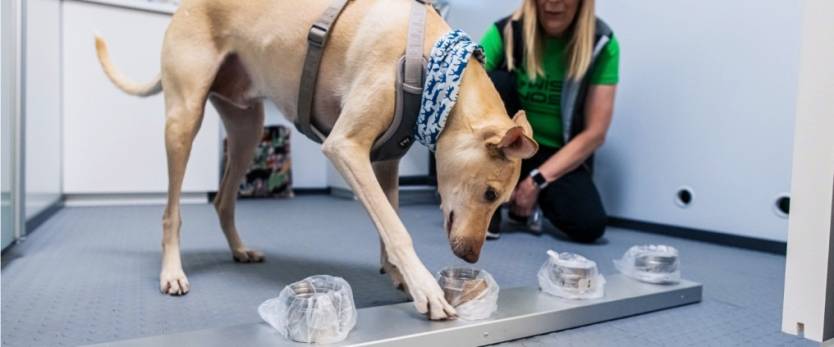- Coronavirus testing is done using PCR tests that analyze the contents of a nasal swab, making screening campaigns cumbersome in certain situations.
- Researchers have found a way to improve the time it takes to detect COVID-19 patients: Dogs trained to sniff out an odor specific to the illness have been deployed at the Helsinki airport in Finland.
- In lab conditions, a dog needed about 10 seconds to conduct the test, and it was able to identify the novel coronavirus nearly 100% of the time.
It was in late March when reports said the London School of Hygiene and Tropical Medicine in the UK was looking to train dogs to sniff out patients infected with the novel coronavirus. Researchers explained that certain illnesses have a direct effect on the odor of the patient, and dogs can be trained to recognize that smell. Doctors have trained labradors and cocker spaniels to detect malaria so well that their accuracy exceeded WHO standards. Still, questions remained about using dogs to detect the novel virus. First of all, a sniff test should be safe for the dog trained to recognize the smell, as there have been some cases where dogs caught COVID-19 from their owners. Secondly, the sniff test still has to be confirmed via a proper PCR test. And finally, this testing method has obvious limitations: You can only train so many dogs to detect COVID-19 patients, and they can only cover a limited amount of ground.
Nearly six months later, researchers from Finland now say their dogs need only a few seconds to smell the virus, and the process works almost 100% of the time. Those dogs will “work” in Helskinki’s airport to screen passengers, and the program might be cheaper than testing everyone who passes through customs using conventional means. Finland is the first country in Europe to pilot the coronavirus-sniffing dog test in airports, but other countries have already implemented similar mass-testing programs.
ET, Kossi, Miina, and Valo are four dogs who got new jobs Wednesday. Their duty is to sniff out COVID-19 patients passing through the Helsinki airport. They work in shifts of two and the pilot project will last four months, costing the city of Vantaa €300,000 ($348,500). Authorities told The Guardian that the figure is significantly lower than laboratory-based testing.
A company called Wise Nose will train six additional dogs to sniff out COVID-19 cases at the Helsinki airport. The University of Helsinki researchers involved with the project said a dog can detect the virus within 10 seconds, and the entire process takes less than a minute to complete.
The sniffing test has been devised in such a way that it protects the health of the dogs involved. Passengers who arrive at the airport collect their luggage, and then they’re asked to use a wipe on their skin. The wipe ends up in a container placed in a different booth next to other boxes with control scents in them. Then the dog starts sniffing them. If a dog detects the virus, it will indicate it to a human by “yelping, pawing, or lying down.” Once that happens, the passenger is advised to take a free PCR test to verify the dog’s assessment.

“It’s very promising,” Anna Hielm-Björkman said. “If it works, it could prove a good screening method in other places,” like hospitals as well as public events and other gatherings.
In preliminary tests, dogs identified the virus with nearly 100% accuracy. What’s even more interesting is that dogs sometimes picked up the scent days before a patient even developed symptoms. While scientists do not know what smell the dogs can detect, a different study from France said in June that there was “very high evidence” that sweat from COVID-positive people was different from the sweat of healthy people, and that dogs can tell the difference.
The Helsinki airport team said that the dogs were also able to identify COVID-19 using a much smaller sample than regular PCR tests. A quantity of 10-100 molecules is enough for dogs to sniff out the virus, compared to 18 million molecules for a lab test.
Research involving dogs that can sniff out the coronavirus is also being conducted in other countries aside from the UK and Finland. Australia, France, and Germany have similar projects underway, per The Guardian. A report a few weeks ago said that countries including the United Arab Emirates, Argentina, Brazil, and Belgium have started training dogs to detect the virus. The Dubai international airport also began a similar pilot program last month.








